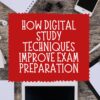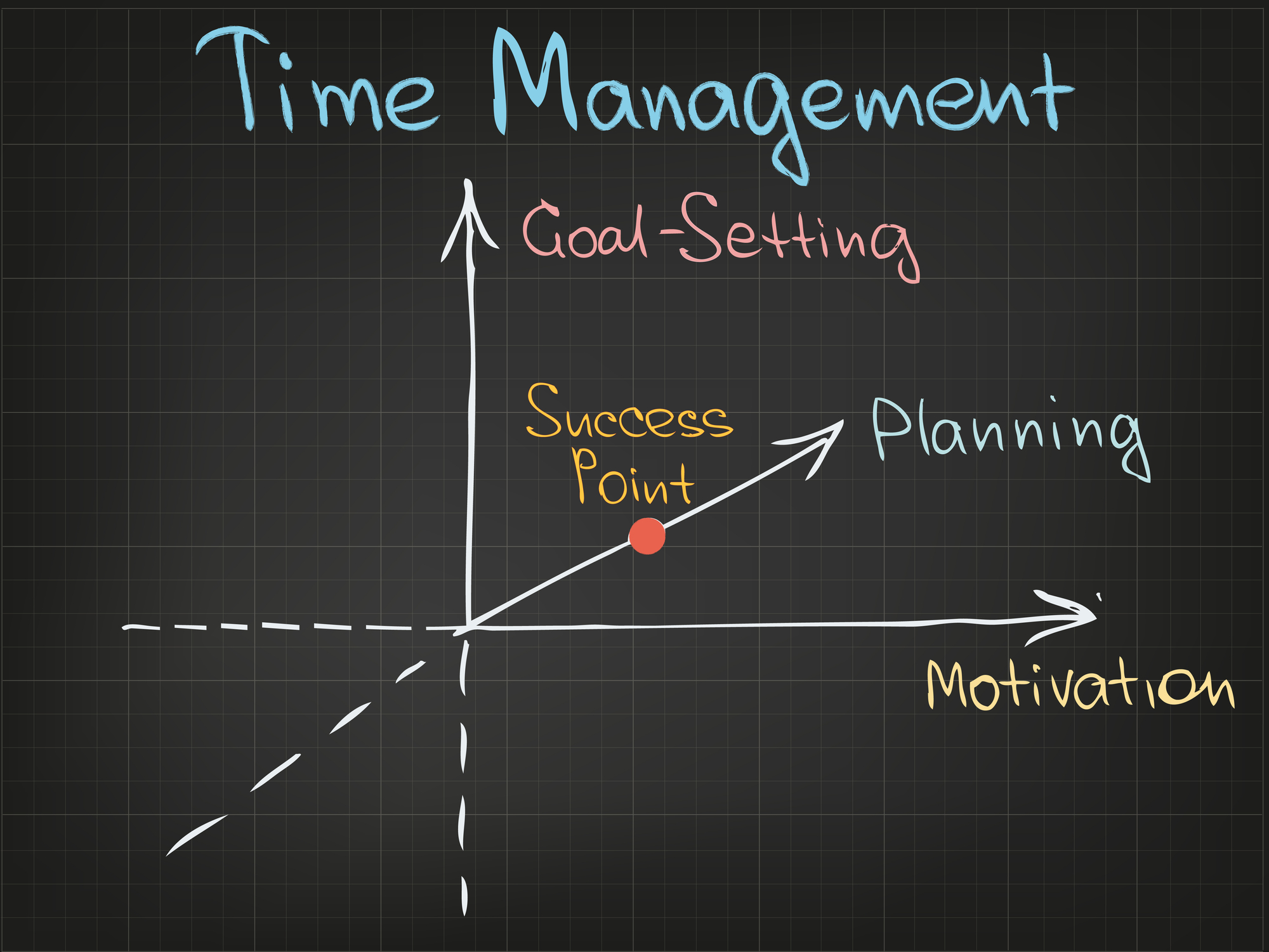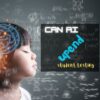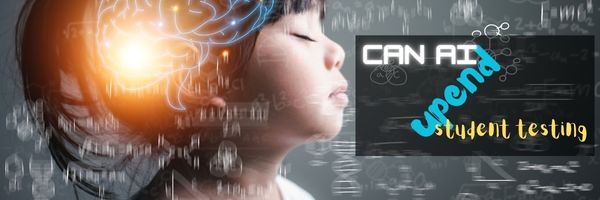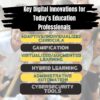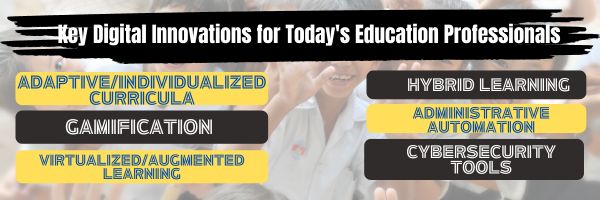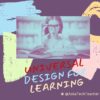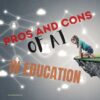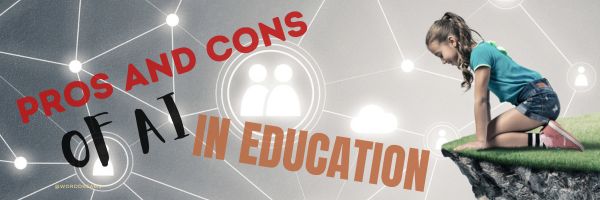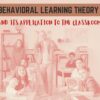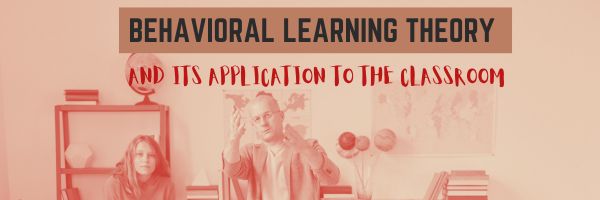Category: Education reform
Building Community in Virtual High Schools
In response to the challenges of COVID, a dissatisfaction with local in-person schools, and increasingly diverse needs of the high school student population, enrollment in US virtual schools is now over 300,000 with about 20% of students taking at least one online course. There are pros and cons of attending class via computer. You can learn on your own schedule, but what if you have connectivity issues? You have more independence in your learning, but what if the teacher isn’t inspirational?
One big issue among many is the importance of building community in virtual schools. The Ask a Tech Teacher team dug into this:
Building Community in Virtual High Schools
As educators, we often hear concerns about the lack of socialization in online learning environments. However, the reality of virtual high schools is far from the isolated, impersonal experience many imagine. In fact, with intentional effort and innovative approaches, an online high school can foster vibrant, supportive communities that rival those of traditional brick-and-mortar institutions.
The Importance of Community in Education
A sense of belonging enhances student engagement, improves academic performance, and supports mental health. In virtual settings, where students might otherwise feel disconnected, building community becomes even more critical.
Strategies for fostering student connection include: (more…)
Share this:
Grade Assignments with PDF Tools
- Getting started
- Grading
- Providing feedback
- Saving and sharing
Grade Assignments with PDF Annotation Tools
As online learning and virtual classrooms gain popularity, educators are turning to new technologies to improve their teaching methods. This shift has led to a significant increase in digital grading tools, which help streamline the evaluation process and provide timely, valuable feedback to students, aiding their academic success.
A particularly useful technology in this realm is PDF annotation. This tool helps educators with text highlighting in order to leave feedback. It also allows them to strike through errors and add detailed notes directly on the student’s work. This eliminates the need for downloading and re-uploading assignments, enabling in-depth commentary.
In this blog post, we’ll explore the features of PDF annotation tools and their capabilities to transform assignment grading and student feedback. (more…)
Share this:
How Digital Study Techniques Improve Exam Preparation
How Digital Study Techniques Improve Exam Preparation
Studying for exams can often feel like this huge, monumental task that causes not only stress but existential anxiety. But it doesn’t have to be this way – yes, the pressure is real, and yes, you may have an immensely demanding study schedule, but with the right tools and strategies, you can turn this daunting challenge into a manageable experience. Maybe even a rewarding one (yes, you read that right).
Here are some of the best digital study techniques that can make your study sessions more effective and help you ace all your exams.
Use Time-Management Tools
Let’s start with the basics: time management. To make sure your every study session is as productive as it can be, you need to learn to manage your time effectively. Meaning, when it’s time to study, you need to make every minute count.
Digital tools like calendar apps like Google Calendar or even Outlook, as well as task managers like Trello or Todoist, can help you organize your study schedule. Likewise, apps like Pomodoro can help you get more focused when studying by splitting your study sessions into 25-minute stretches of work and 5-minute breaks.
Invest in Quality Online Study Resources
There’s no reason to study like a monk – the internet is full of diverse study materials that cater to different learning styles, including yours. Websites like Khan Academy or Quizlet provide access to lectures, practice tests, and flashcards among other things.
For example, with Quizlet, you can create digital flashcards and practice tests tailored to your syllabus. If you’re preparing for a really demanding exam, like the bar exam, online resources like Quimbee offer everything you need to pass it.
Say you want to prepare effectively for the North Carolina bar test – they have multiple full-length practice MBEs and thousands of MBE practice questions, plus offer personalized feedback from an attorney for practice essays to help you succeed. Of course, all of the course material can be studied from your computer. (more…)
Share this:
How to Help Students Run a Genius Bar
From the Ask a Tech Teacher team: ideas on a student-run genius bar:
How to Help Students Run a Genius Bar
Modeled after Apple’s popular tech support stations, a Genius Bar in a school setting is a student-run help desk where peers provide tech support, advice on digital tools, and assistance with various tech-related issues. Teachers play a crucial role in guiding students to run this service effectively, ensuring it becomes a valuable resource for the entire school community.
By providing the necessary support and structure, teachers can help students develop leadership, teamwork, and problem-solving skills through the Genius Bar. (more…)
Share this:
AI has potential to upend student testing
AI has the potential to revolutionize education for better or worse–jury’s still out on that. No one denies it can make student testing more efficient, faster, possibly leading to better educational outcomes for all learners. Key positives:
- Tailor personalized learning paths
- Adapt testing to challenge students at their appropriate level of knowledge
- Provide instant feedback
- Reduce bias
- Analyze data quickly to find learning patterns and trends.
- Identify plagiarism or cheating
But there are drawbacks educators must watch for and may take time to resolve. Check out these concerns:
- Bias and fairness
- Privacy and data security
- Reliability and accuracy
- Dependency on technology
- Digital divide
- Loss of human connection
- Ethical considerations
Here’s a good article from The Hechinger Report that offers an overview of current thinking on how AI is likely to reshape student testing options:
AI has potential to upend student testing
As AI advances, student testing could become highly personalized and dynamic, offering scenarios like empathetic avatar interactions and adaptive questions. While experts acknowledge risks such as bias and access disparities, they foresee AI-driven assessments reshaping education by tailoring tests to individual needs and promoting deeper learning. (more…)
Share this:
Key Digital Innovations for Today’s Education Professionals
6 Key trends in education to be looking at, from the Ask a Tech Teacher team:
Key Digital Innovations for Today’s Education Professionals
The digital transformation is underway, and while its impact on society is undeniable, education is among the most disproportionately affected areas. It’s not just about ditching blackboards for tablets – education today is undergoing a paradigm shift in teaching methodologies.
It’s not far-fetched to claim that technology is reshaping the philosophical and practical underpinnings of education. This article brings an overview of key trends that are leading the charge. (more…)
Share this:
Universal Design for Learning: What is it? Why use?
Education has come a long way since the focus on “reading, writing, ‘rithmetic”. In Ask a Tech Teacher posts, we’ve covered many teaching strategies:
- Behavior Learning Theory
- Depth of Knowledge (DoK)
- Flipped Classroom
- Frayer Model
- Growth Mindset
- Habits of Mind
- Mindfulness
- Orton-Gillingham
- Project-based Learning (PBL)
- Socratic Method
- Standards-based Grading
- Understanding By Design
- Unschool
- VARK model
- Visible Learning
- Whole Brain Teaching
Any of these might be perfect for your classroom. Today, we offer one more: Universal Design for Learning (UDL) (more…)
Share this:
Pros And Cons of AI in Education
Artificial Intelligence–AI–has been around a long time, but caught everyone’s attention with the launch of generative AI, ChatGPT, and DALL-E. These made using AI easy enough for anyone and a viable tool for educators and students.
Or is it? Let’s see what the Ask a Tech Teacher team says:
Pros And Cons of AI in Education
Artificial intelligence (AI) is making major inroads into education. AI tutors, virtual assistants, and adaptive learning platforms are being adopted by schools, colleges, and universities around the world. In addition, many students are using AI to write coursework and essays, which has caused a lot of outrage.
Proponents argue AI can make education more personalized, engaging, and effective while reducing costs and workload for teachers. However, critics worry about the risks and limitations of relying too heavily on AI in education, as well as the problems caused by students using AI rather than penning work themselves.
Here we explore some of the key pros and cons of the increasing use of AI in education, from an education professional’s perspective.
Share this:
Understanding Behavioral Learning Theory & Its Applications In The Classroom
The Ask a Tech Teacher team has written a great article on behavioral learning in the classroom. You’ll find out:
- What it is
- Keys to unpacking it
- Why it matters in education
- Examples in the classroom
- Techniques for applying it
- Challenges
Behavioral Learning Theory & Its Applications In Class
If you’re an educator or a parent, equipping yourself with knowledge of behavioral learning theory can transform your classroom dynamics and alter how you perceive the process of learning itself. If the entire concept is alien to you at the moment, hold tight as we talk you through the main aspects, and how they can hold relevance in modern teaching environments.
Introduction to Behavioral Learning Theory
Behavioral learning theory can sound complex, but it’s actually quite straightforward. It stipulates that all behaviors are learnt through interactions with the environment.
While biology may play a part, this theory focuses on acquired behavior and how your responses can change over time.
Conditioning is at the center of this theory, and it posits that humans learn by developing associations between their actions and the consequences they experience in real-time.
Share this:
Left-brain or Right-brain Dominant? Explore the Ideal Subjects to Nurture your Strengths
Left-brain or Right-brain Dominant? Explore the Ideal Subjects to Nurture your Strengths
Choosing what to study after high school can be tough. A popular theory that aids some students in their decision-making process is the left-brain vs right-brain theory. It suggests that people have a dominant side of their brain, which influences their thinking and learning styles. While it’s important to note that this theory has been debated and may not be entirely accurate, it can be helpful to understand your strengths when choosing subjects to study. This article will explore the ideal subjects for individuals who are left-brain or right-brain dominant.
Subjects for People Who Are Left-brain Dominant
If you are left-brain dominant, you are likely to be more analytical, logical and detail-oriented. You excel in subjects that require problem-solving skills and have a strong understanding of numbers and patterns. Here are some ideal subjects for left-brain dominant individuals:






